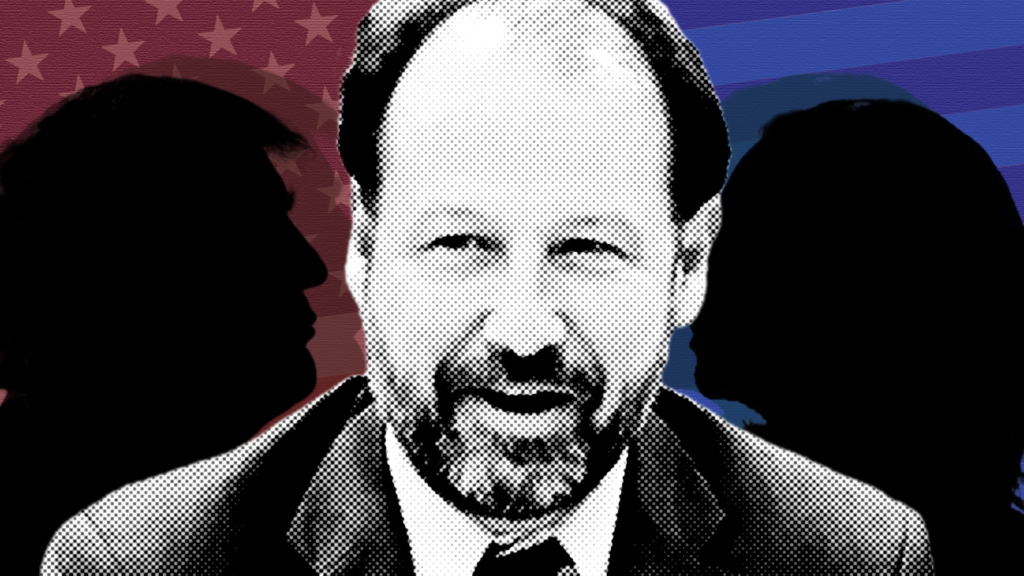Question for the candidates: Do you agree with other world leaders that the use of—or threat to use—nuclear weapons is “inadmissible”?
By Daryl G. Kimball | September 19, 2024

Editor’s note: Daryl Kimball, director of the Arms Control Association, suggests four questions about the use of nuclear weapons, US-Russia arms control, and Iran that journalists and citizens should ask the 2024 presidential candidates. (This is part of an “experts comment” series of questions for the candidates.)
American voters across the political spectrum are increasingly aware and, according to recent polling, deeply concerned about nuclear weapons dangers. However, so far in the unorthodox 2024 presidential race, there has been virtually no indication from Vice President Kamala Harris or former president Donald Trump on whether they have a plan—or even “the concept of a plan”—for dealing with the existential threat posed by nuclear weapons.
Yet there are at least three critical sets of issues the next president will have to make decisions about within weeks—or even days—of Inauguration Day.
Use of nuclear weapons
Perhaps the most consequential responsibility for a US president, who has the sole authority to order the use of nuclear weapons, is to avoid events that could lead to a nuclear war. As Russia’s war in Ukraine drags on, there is a heightened risk of escalation that could involve US or NATO forces, or Russian nuclear threats, or even nuclear weapons use. In addition, there is a growing risk of a conflict with nuclear-armed China over its claims to Taiwan. And as Kim Jong-un builds up his nuclear retaliatory force, there are plausible scenarios involving nuclear war with North Korea.
So, a first-order question the candidates should be asked during the campaign is:
- Do you agree with former president Ronald Reagan, who said in 1984 that “a nuclear war cannot be won and must never be fought. The only value in our two nations possessing nuclear weapons is to make sure they will never be used. But then would it not be better to do away with them entirely”?
Relatedly:
- Do you agree with the leaders of the Group of 20 states meeting in Indonesia who declared in 2022 and 2023 that the use of nuclear weapons and threats of their use are “inadmissible”?
US-Russia arms control
The next president will have to make key choices that determine whether or not a destabilizing, three-way arms race can be avoided after the only remaining Russian-US arms control agreement, the New Strategic Arms Reduction Treaty (New START), expires in 2026.
The Trump and Biden administration approaches to nuclear arms control have differed on paper and in practice. As the first expiration deadline for New START approached on February 5, 2021, Trump’s team refused to agree to a simple five-year extension of the pact. Instead, Trump’s officials said that the United States would contemplate only a short-term extension of the treaty—and only if Russia agreed to a framework for a new trilateral treaty that verifiably covers all nuclear warheads, and only if China were part of such an arrangement.
The gambit failed, which led Trump’s arms control envoy to threaten that the United States could spend Russia and China “into oblivion” in a new nuclear arms race if they did not agree to the US proposal.
This left the incoming Biden administration only days after Inauguration Day to reach a deal with the Kremlin to extend the pact by five years—and it did in early 2021. After their summit in Geneva that year, presidents Joe Biden and Vladimir Putin agreed to resume “strategic stability” talks, but these were suspended following Russia’s February 2022 invasion of Ukraine.
In June 2023, the Biden administration proposed talks with Russia “without preconditions” on a new, post-2026 “nuclear arms control framework.” In his September 2023 speech to the United Nations, Biden reiterated that “[N]o matter what else is happening in the world, the United States is ready to pursue critical arms control measures.”
In January 2024, however, Russia formally rejected the US offer to re-open the nuclear arms control dialogue because, it said, the United States was seeking the strategic defeat of Russia through its support of Ukraine.
Russia and the United States have pledged to stay within the limits set by New START (1,550 deployed strategic nuclear warheads for each country) as long as it is in force and as long as the other side does the same. But without a new understanding to restrain their strategic arsenals after the treaty expires, the two countries could double the size of their deployed arsenals by uploading additional warheads on existing missiles, which would further complicate efforts to constrain China’s ongoing buildup of its arsenal, which is now estimated to consist of around 310 warheads on strategic delivery systems. (China possesses roughly 500 nuclear warheads in total.)
- Will you or will you not seek a deal of some kind with Russia to stay below the current limit of 1,550 deployed strategic warheads until a longer-term Russian-US nuclear arms control framework agreement can be concluded?
Iran
Finally, whoever is elected will have to deal with the worsening challenge of containing Iran’s capability to produce weapon-usable nuclear material.
In 2018, the Trump administration withdrew unilaterally from the 2015 Joint Comprehensive Plan of Action (also known as the “Iran nuclear deal”) and imposed tougher US sanctions to try to pressure Tehran into negotiating a new and “better” deal.
Iranian leaders rejected that approach, and they have retaliated by increasing their capabilities to produce weapon-grade uranium significantly and curtailed cooperation with the International Atomic Energy Agency. Iran is now capable of amassing enough highly enriched uranium for one bomb within as little as a week (as opposed to more than a year under the 2015 nuclear deal).
Biden pledged to restore mutual compliance with the 2015 deal but failed to act early in his term to do so. Efforts to lower tensions through parallel actions by each side were complicated by Iranian demands in mid-2023 that Biden guarantee that a future US administration would abide by the arrangement, and more recently because of Iran’s drone and missile transfers to Russia, tensions between Israel and Iran, and the war in Gaza. In September, Iran’s new reformist president, Masoud Pezeshkian, said Iran is “seeking a return to the framework of the [2015] nuclear deal. If they stop, we shall stop, too. If they are committed to the accord, we will be, too,” Pezeshkian said. “We are not seeking nuclear [arms]. But we will not bow down to pressure.”
Problems lie ahead if the next US administration fails to take advantage of this rare opportunity.
If the United States or other UN Security Council members snap back international sanctions against Iran (as most former Trump advisers have proposed), Iran has threatened to pull out of the Treaty on the Non-Proliferation of Nuclear Weapons (NPT) and begin producing weapon-grade fissile material.
- How will you learn from your administration’s past mistakes and find a more effective diplomatic strategy to contain Iran’s nuclear program to prevent it from acquiring nuclear weapons?
As Americans cast their ballots, they have a right to know how their choice may affect whether risks of nuclear arms racing, proliferation, and nuclear war will rise or fall in the years ahead.
Has Russia’s war in Ukraine changed your view of the role of nuclear weapons? By Siegfried S. Hecker
What will you do to avoid a nuclear arms race with Russia and China? By Steven Pifer
What is your plan to prevent the next dangerous and expensive nuclear arms race? By Laura Grego
How many nuclear warheads does the United States need? By Tom Z. Collina
Should the president retain the sole authority to order the use of nuclear weapons? By Mackenzie Knight
Do you agree with other world leaders that the use of—or threat to use—nuclear weapons is “inadmissible”? By Daryl G. Kimball
How will you reassure allies worried about the credibility of the US security guarantees? By Sara Bjerg Moller
What will you do if Iran gets the bomb? By Henry Sokolski
How will you deter North Korea’s aggression without deteriorating the situation on the Korean Peninsula? By Eliana Johns
Will the United States sign and ratify the Treaty on the Prohibition of Nuclear Weapons? By Alicia Sanders-Zakre
Together, we make the world safer.
The Bulletin elevates expert voices above the noise. But as an independent nonprofit organization, our operations depend on the support of readers like you. Help us continue to deliver quality journalism that holds leaders accountable. Your support of our work at any level is important. In return, we promise our coverage will be understandable, influential, vigilant, solution-oriented, and fair-minded. Together we can make a difference.
Keywords: Iran, New START, Russia, United States, candidate questions 2024, nonproliferation, nuclear taboo
Topics: Nuclear Weapons















